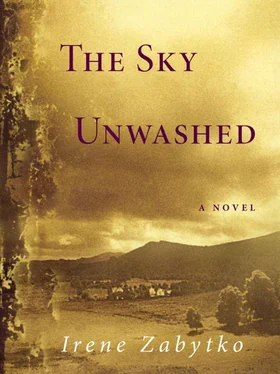WEDDINGS WERE A common occurrence in Starylis. So were divorces, but those weren’t publicly celebrated as much except by the men in the community who got together to slander the women, and to drink the home-brewed hundred-proof samohon someone would always bring to offer the man who was set free.
Most of the marriage celebrations in the village were planned for the late spring, because the Soviet government encouraged the young people to openly defy the Lenten prohibition against weddings. The older people were too powerless to protest, and would go along with their grandchildren’s weddings if they could somehow include some of the old traditions. Gradually, more weddings were performed in the Soviet city halls and in the churches which the Communists allowed to operate provided that a government-appointed priest officiated. The government’s priest in Starylis was Father Andrei, who happened to work at the Chornobyl plant. He was glad enough for both jobs, and eager to perform any church wedding the KGB allowed him, regardless of the contradictory situation he and his flock had to endure.
Marusia could not remember a spring when she and her family had not attended many weddings. She decided that out of the several that would take place in the village over the coming weekend, she would attend the wedding of the granddaughter of Evdokia Zenoviivna. Evdokia had promised that the ceremony would be traditional and Christian, held in the village church and performed by the priest, and not the usual unholy service where the bride and groom simply signed a register at the ZAKS, the magistrate’s office.
Evdokia had expressly asked Marusia to bake her famous wedding bread—a korovai —for the reception, a party that Evdokia declared would be special because her son-in-law, “that stupid Bolshevik,” had been able to rent the klub , the village social center, for the occasion. The klub was also the village headquarters for the komsomol meetings, and everyone knew that because Evdokia’s granddaughter and bride-to-be, Hanna Koval, was past komsomol president, and because her father had paid off the klub ’s director, theirs was the only wedding party given permission to use the building that weekend. Since Evdokia had insisted Hanna get married in the church, Hanna balanced public opinion by having the rest of her ceremony—“the best part,” as she put it—at the most obvious Communist building in the village.
Marusia spent all day Thursday preparing the dough for the huge korovai before carrying it to the communal outdoor oven a short walk down the dirt road from her home. She liked using the old-style oven better than her own stove that heated either too quickly or not at all. She sat down on one of the wooden benches and thought what a warm day it was, warmer than the past few weeks.
“ Slava Isusu Khrystu ,” said the reedy voice of Slavka Lazorska, who was making her way up the little hill to where Marusia sat. Slavka Lazorska held a jar of clear liquid.
“ Slava na viky ,” answered Marusia. “God give you peace and health.”
“And you,” said Slavka Lazorska. The tall, lean woman sat down beside Marusia. “I smell your famous work of art. Whose wedding is it for this time?”
“Hanna’s.”
Slavka Lazorska snorted. “Oh, her. That one. She has to get married you know.”
“Yes, I know.” Marusia shook her head. “Well, these young ones with their, you know, modern socialism and…” She bent toward her friend and whispered, “sex.”
“At least we had the decency to blame our bad behavior on the war,” said Slavka Lazorska. The old women laughed.
“Now, no one bothers to excuse themselves,” said Marusia. “They just sew material enough for two white wedding dresses and there it is, for anyone to see.”
“So true. The little whores.” Slavka Lazorska laughed. “I’m going to attend that other one’s wedding—you know, Ania Podilenko. The one with the fake red hair. Somehow she’s related to me, I don’t know how. Probably from some bastard’s side of the family I’m not even sure of. Everyone’s related to me all of sudden when they want a present.”
“What are you getting her?”
Lazorska untied her green and black paisley babushka and wiped her face with it. Her lank iron-gray braids were coiled tightly like chain mail and wrapped around her head several times. “Well, she—that other one, Ania—is not like that rabbit, Hanna. Ania has a hard time getting a baby. So I made up an herbal potion to help her along. She’s no young chicken, either. Way past thirty, and this her fourth marriage.”
Marusia was impressed. Slavka Lazorska was the village healer, as all the women in her family had been. She boasted that she was never sick a day in her life, not even during the war when people dropped in the streets like acorns after a windstorm. Her garden was the largest patch of privately owned land in Starylis. In it, she grew all of the herbs and plants she used in her treatments. And she worked with the cups—large glass jars heated over a flame which she strategically applied to soothe the arthritis in a sore leg or loosen the phlegm in an inflamed chest. Lazorska was famous for her poultices and mustard plasters and was particularly revered for knowing the right cures for women’s ailments, especially when a woman lost her female pleasure juices or the “gripping powers” in a womb that should cushion and hold a child inside.
Marusia was a little afraid of Lazorska and only called on her when prayers and conventional medicine failed.
She had first met Slavka Lazorska during the horrible typhus epidemic right after the war. The Red Cross had not gotten medical supplies through to Starylis. Marusia’s mother was near death before she begged her daughter to fetch the “ dokhtor ,” the title given to Slavka Lazorska’s own mother. Marusia couldn’t find her, but brought back the daughter, whose hair was coal black then, as were her arched eyebrows that met in the center of her high forehead, her skin taut and smooth as an olive. When Marusia first saw her, she felt sure she was a witch or a Gypsy and distrusted her exotic darkness. Even so, Slavka Lazorska cooled Marusia’s old mother with a healing poultice mixed in snow that quenched her fever and resurrected her.
The second time Marusia called on Lazorska was when she was far along into her sad marriage and begged for an herb to conceive a child. “It might keep him at home,” Marusia had confessed to Lazorska in shame. From it, Yurko her son was born, and Marusia always remembered that she owed the healer two more major, unrepayable debts—one for her son’s birth, the other that Lazorska never betrayed Marusia’s secret.
“Is that the gift?” Marusia asked shyly, pointing to the jar.
“This? Oh, no! This is just some vintage leftover samohon Fed’ko at the co-op wanted me to sample. Here, have a taste.” She unscrewed the top of the jar and held the pure grain vodka out to Marusia.
“ Na zdorovia ,” Marusia said. She took a long swig. “Ahh. Thank you. Very good. Luxe . First class.”
“Yes, it’s about the best I’ve had all season. But he better not try to sell me any. You know, I gave that devil’s son my own recipe. And then he has the nerve to tell me it’s from an ancient family formula that was handed down from his great great great Kozak grand-father who slept with the tzarina’s horse or some such cow shit.”
The women laughed. Slavka Lazorska took her turn and wiped her mouth with the sleeve of her woolen cardigan before handing the jar back to Marusia. The healer smiled openly at her, exposing the gold in her teeth and brightening her sallow, triangular face.
Читать дальше











